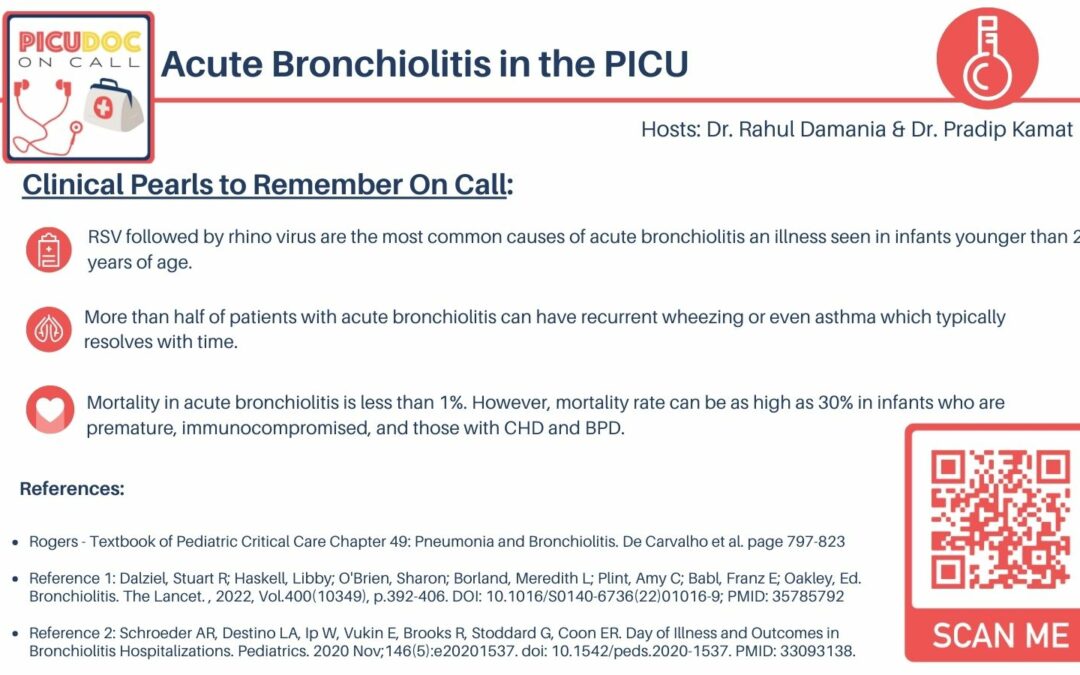Hosts:
- Pradip Kamat, Children’s Healthcare of Atlanta/Emory University School of Medicine
- Rahul Damania, Cleveland Clinic Children’s Hospital
Introduction
Today, we discuss the case of an 8-month-old infant with severe bronchospasm and abnormal blood gas. We’ll delve into the epidemiology, pathophysiology, and evidence-based management of acute bronchiolitis.
Case Summary
An 8-month-old infant presented to the ER with decreased alertness following worsening work of breathing, preceded by URI symptoms. The infant was intubated and transferred to the PICU, testing positive for RSV. Initial blood gas showed 6.8/125/-4, and CXR revealed massive hyperinflation. Vitals: HR 180, BP 75/45, SPO2 92% on 100% FIO2, RR 12 (prior to intubation), now around 16 on the ventilator, afebrile.
Discussion Points
- Etiology & Pathogenesis: Bronchiolitis is primarily caused by RSV, with other viruses and bacteria playing a role. RSV bronchiolitis is the most common cause of hospitalization in infants, particularly in winter months. Immuno-pathology involves an unbalanced immune response and can lead to various extra-pulmonary manifestations.
- Diagnosis: Diagnosis is clinical, based on history and examination. Key signs include upper respiratory symptoms followed by lower respiratory distress. Blood gas, chest radiography, and viral testing are generally not recommended unless warranted by severe symptoms or clinical deterioration.
- Management Framework: For patients requiring PICU admission, focus on oxygenation and hydration. High-flow therapy and nasal continuous positive airway pressure (CPAP) can be used. Hydration and feeding support are crucial. Antibiotics, steroids, and bronchodilators are generally not recommended. Mechanical ventilation and ECMO may be necessary in severe cases.
- Immunoprophylaxis & Nosocomial Infection Prevention: Palivizumab and nirsevimab are used for RSV prevention in high-risk infants. Strict infection control measures, including hand hygiene and isolation, are essential to prevent nosocomial infections.
Conclusion
RSV bronchiolitis is a common and potentially severe respiratory illness in infants. Management focuses on supportive care, with a careful balance between oxygenation and hydration. Immunoprophylaxis and infection control are crucial in preventing the spread of the virus.
Thank you for listening to our episode on acute bronchiolitis. Please subscribe, share your feedback, and visit our website at picudoconcall.org for more resources. Stay tuned for our next episode!
References
Rogers – Textbook of Pediatric Critical Care Chapter 49: Pneumonia and Bronchiolitis. De Carvalho et al. page 797-823
Reference 1: Dalziel, Stuart R; Haskell, Libby; O’Brien, Sharon; Borland, Meredith L; Plint, Amy C; Babl, Franz E; Oakley, Ed. Bronchiolitis. The Lancet. , 2022, Vol.400(10349), p.392-406. DOI: 10.1016/S0140-6736(22)01016-9; PMID: 35785792
Reference 2: Schroeder AR, Destino LA, Ip W, Vukin E, Brooks R, Stoddard G, Coon ER. Day of Illness and Outcomes in Bronchiolitis Hospitalizations. Pediatrics. 2020 Nov;146(5):e20201537. doi: 10.1542/peds.2020-1537. PMID: 33093138.


Wonderful initiative. Very helpful and crisp concepts. Helpful to even practising intensivists!